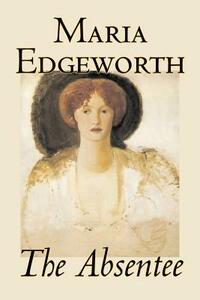Take a photo of a barcode or cover
lighthearted
reflective
medium-paced
My edition was printed around 1900, which I don't see listed in Goodreads, but that's okay.
This novel was part of a longer collection, printed during the Regency period. It centers around an Irish family of title, the parents having come to England to be part of the Season. Edgeworth takes down the phoniness of high society with as much energy and verve as Cruikshank and the other satirical illustrators did.
Lord Columbre, their son and our hero, doesn't change so much as act as catalyst. He is disgusted by falsity in society, and in his mother, and he's horrified to discover that his father has been wasting the family's fortune on his mother's wish to buy her way into acceptance by the beau monde.
He ends up returning to Ireland and traveling around incognito to see for himself how the family lands are handled, with a sidestep in being almost lured in by a monster-mama and her conniving daughter.
The best scenes, by far, are the ones among the ordinary Irish folk. Some of the high society scenes are sarcastically humorous. But the book is packed with long, somewhat tedious preachments at the reader who might have missed the point; in other reading I discovered that Edgeworth's father saw fit to edit, and add to, his daughter's fiction as he thought it needed. The result were these didactic data dumps to really hammer home the point.
Other warnings for the modern reader: the careless and unexamined anti-semitism really stands out next to the sympathy for the Irish peasantry, and Lord Columbre's insufferable middle-class attitude toward his beloved when he thinks she might be base-born, but when it turns out the father did manage to marry the teenager he winnowed away from her home, got pregnant, and then died on, and further, she's in for a smacking big fortune, well, suddenly it's okay for him to marry her, though she's good as gold and blameless all the way through, the way proper heroines of the time were supposed to be.
Still, one can see why Edgeworth was so popular--and the look into the Irish life of the time is fascinating.
This novel was part of a longer collection, printed during the Regency period. It centers around an Irish family of title, the parents having come to England to be part of the Season. Edgeworth takes down the phoniness of high society with as much energy and verve as Cruikshank and the other satirical illustrators did.
Lord Columbre, their son and our hero, doesn't change so much as act as catalyst. He is disgusted by falsity in society, and in his mother, and he's horrified to discover that his father has been wasting the family's fortune on his mother's wish to buy her way into acceptance by the beau monde.
He ends up returning to Ireland and traveling around incognito to see for himself how the family lands are handled, with a sidestep in being almost lured in by a monster-mama and her conniving daughter.
The best scenes, by far, are the ones among the ordinary Irish folk. Some of the high society scenes are sarcastically humorous. But the book is packed with long, somewhat tedious preachments at the reader who might have missed the point; in other reading I discovered that Edgeworth's father saw fit to edit, and add to, his daughter's fiction as he thought it needed. The result were these didactic data dumps to really hammer home the point.
Other warnings for the modern reader: the careless and unexamined anti-semitism really stands out next to the sympathy for the Irish peasantry, and Lord Columbre's insufferable middle-class attitude toward his beloved when he thinks she might be base-born, but when it turns out the father did manage to marry the teenager he winnowed away from her home, got pregnant, and then died on, and further, she's in for a smacking big fortune, well, suddenly it's okay for him to marry her, though she's good as gold and blameless all the way through, the way proper heroines of the time were supposed to be.
Still, one can see why Edgeworth was so popular--and the look into the Irish life of the time is fascinating.
Is there some deux ex machina? For sure.
Is that unusual for novels from this period? Not really.
Did I thoroughly enjoy the novel nonetheless? Most definitely.
Also, as I see it, the main goal of this novel is to convince its readers about the evils of being an absentee and to paint an honest and just picture of Ireland for those who are prejudiced against it. Of course, doing all of this in the much more accessible and enjoyable form of a novel.
Is that unusual for novels from this period? Not really.
Did I thoroughly enjoy the novel nonetheless? Most definitely.
Also, as I see it, the main goal of this novel is to convince its readers about the evils of being an absentee and to paint an honest and just picture of Ireland for those who are prejudiced against it. Of course, doing all of this in the much more accessible and enjoyable form of a novel.
Meh. Needed to read this for my book group. Good points - it was a fast read - I learned a little bit about absentee Irish landlords. Otherwise it was an annoying read. Copious unnecessary notes. Once I learned to ignore them, the reading process went a bit more pleasantly. Her style of emphasizing oddly accented dialogue was very annoying. The wrap-up of the story was as expected. This could have been written by a 12-13 year old who had a political agenda.
challenging
slow-paced
Strong character development:
No
Diverse cast of characters:
No
Minor: Antisemitism, Classism
medium-paced
Plot or Character Driven:
Plot
Diverse cast of characters:
No
The omniscient 3rd person narrator gives many different perspectives, but most of them are short lived, not extended, so it doesn't feel like too much head hopping to me. Perhaps because it is always clear that the narrator is none of the characters. So the narrator tells us that Lady Clonbrony is trying really hard to make a good impression and immediately tells readers how her actions are being received by others (generally not well). One lesson from this book that is still applicable today is don't go into debt trying to impress people who are determined to not accept you. I think that the critiques The Absentee makes about British and Irish society in the early 18oos are valid, but I am skeptical of the solutions it puts forward. It can be rather heavy-handed at times repeating in the mouths of peasants "If only our landlord was present to take care of us and did not leave us at the mercy of thieving middlemen, If only our landlord was here to encourage us to be industrious and better ourselves with education (to be better peasants - not to social climb)." The book also 100% uses the ideology that people from different nations (like Britain or Ireland) all have similar 'national character' that is 'natural' to them because they are, for example, Irish. The Absentee has good Irish characters and villainous Irish characters. It also has an antisemitic caricature who is a main villain and shows up several times.
I read this for Book Riot's 2023 Read Harder Challenge #6 read a book I DNFed. I started it almost 2 years ago but I was having a rough time, so my DNFing doesn't really reflect on the book. The romance plot was kind of sweet, at 85% through, I thought things would be easy to tie up in like 3 pages, but I feel like Edgeworth had fun with sending the hero hither and thither to search for papers and a squirrelly old man.
Apparently Edgeworth was one of Jane Austen's favorite writers, so I am going to count this for Book Riot's Challenge #2: Read on of your favorite author's favorite books.
I read this for Book Riot's 2023 Read Harder Challenge #6 read a book I DNFed. I started it almost 2 years ago but I was having a rough time, so my DNFing doesn't really reflect on the book. The romance plot was kind of sweet, at 85% through, I thought things would be easy to tie up in like 3 pages, but I feel like Edgeworth had fun with sending the hero hither and thither to search for papers and a squirrelly old man.
Apparently Edgeworth was one of Jane Austen's favorite writers, so I am going to count this for Book Riot's Challenge #2: Read on of your favorite author's favorite books.
I needed to find a book whose author shared either my first name or last name. Since it's highly unlikely I'll find a book on FreeBooks that shares my last name, I found this one, by Maria Edgeworth.
The interesting thing about this book is that it was published in the same year as [b:Sense and Sensibility|14935|Sense and Sensibility|Jane Austen|http://photo.goodreads.com/books/1309203534s/14935.jpg|2809709]. And yet they're different. This book focuses on Lord Colambre, who is an absentee from Ireland. He's not yet of age, he's in love with his cousin, Grace Nugent, and he's hoping to marry her once he visits Ireland.
Let me say that in its time, this was definitely a very funny book. There are at least three highly comic scenes (one featuring a menagerie of animals and an eccentric count), there are funny sayings… really, the only reason I wasn't falling off my chair was because of the style— which you have to admit is a bit outdated.
That said, this was a highly enjoyable book. I'm not going to give away any spoilers (I can't help but click on VIEW SPOILER whenever I see it). Suffice it to say this is definitely worth a read. Definitely.
The interesting thing about this book is that it was published in the same year as [b:Sense and Sensibility|14935|Sense and Sensibility|Jane Austen|http://photo.goodreads.com/books/1309203534s/14935.jpg|2809709]. And yet they're different. This book focuses on Lord Colambre, who is an absentee from Ireland. He's not yet of age, he's in love with his cousin, Grace Nugent, and he's hoping to marry her once he visits Ireland.
Let me say that in its time, this was definitely a very funny book. There are at least three highly comic scenes (one featuring a menagerie of animals and an eccentric count), there are funny sayings… really, the only reason I wasn't falling off my chair was because of the style— which you have to admit is a bit outdated.
That said, this was a highly enjoyable book. I'm not going to give away any spoilers (I can't help but click on VIEW SPOILER whenever I see it). Suffice it to say this is definitely worth a read. Definitely.
emotional
hopeful
reflective
slow-paced
Plot or Character Driven:
Plot
Strong character development:
No
Loveable characters:
Yes
Diverse cast of characters:
No
Flaws of characters a main focus:
Complicated




